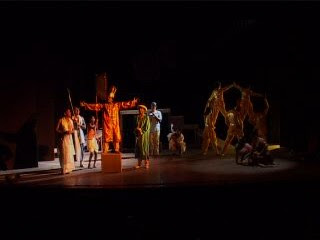In 29th June 1960, he formed the group Nandikar as a wing of IPTA. Primarily the group
 was called Nandikar Gananatya Sangha. His squabble with the party began after his production, Natyakarer Sandhane Chhati Charitra (1961), adopted from Luigi Pirandello’s Six Characters in Search of an Author. Although the content of the play was condoned by IPTA, the major argument remained as to whether such a play could be staged under its banner. His dissociation from IPTA as well as Nandikar began at this point. The central ideological contradiction regarding the autonomy of an artist was the foundation of his differences with the authoritarian outlook of the party. This led to his departure from the Communist Party of India.
was called Nandikar Gananatya Sangha. His squabble with the party began after his production, Natyakarer Sandhane Chhati Charitra (1961), adopted from Luigi Pirandello’s Six Characters in Search of an Author. Although the content of the play was condoned by IPTA, the major argument remained as to whether such a play could be staged under its banner. His dissociation from IPTA as well as Nandikar began at this point. The central ideological contradiction regarding the autonomy of an artist was the foundation of his differences with the authoritarian outlook of the party. This led to his departure from the Communist Party of India.Ajitesh was a prolific actor who not only mastered direction but was also a brilliant composer of songs. Bangla theatre saw a whole gamut of plays from all around world being adopted by him. In 1977, he left Nandikar and went on to form another theatre group Nandimukh.
Some of the significant productions of Nandikar directed by him:
Bidehi (An adaptation of Ghosts by Henrik Ibsen)
Dao Phire Se Aranya ( Chittaranjan Ghosh)
Setubandhan (Ajitesh Bandyopadhaya)
Char Adhaya (Rabindranath Tagore)
Prastab (An adaptation of Proposal by Anton Chekov)
Natyakarer Sandhane Chhati Charitra (An adaptation of Six Characters in Search of an Author by Luigi Pirandello)
Nanaranger Din (An adaptation of Swan Song by Anton Chekov)
Bodnaam (Rabindranath Tagore)
Manjari Amer Manjari (An adaptation of Cherry Orchard by Anton Chekov)
Ratri (An adaptation of A Dream by Zimermann)
Jakhan Eka (An adaptation of Roots by Arnold Wesker)
Nilima (An adaptation of The Lesson by Eugene Ionesco)
Tin Paysar Pala (An adaptation of The Threepenny Opera by Bertolt Brecht)
Antigone (Sophocles)
Sher Afghan (An adaptation of Richard III by Luigi Pirandello)
Mudrarakshas (Bishak Dutta)
Bhalomanush (An adaptation of Good Woman of Szechwan by Bertolt Brecht)
Paap Punya (An adaptation of The Power of Darkness by Leo Tolstoy).
(To be contd.)
[We are starting a series on theatre personalities, primarily form Bengal and other parts of India. If we get your support, then we would like to spread this to include theatre genres and movements as well.]





 king. As the bird is unruly and is prone to flying and singing, the king and his court (the general, the pundits and the ministers) decide that it must be tamed. A grand plan is drawn up to educate the bird.
king. As the bird is unruly and is prone to flying and singing, the king and his court (the general, the pundits and the ministers) decide that it must be tamed. A grand plan is drawn up to educate the bird.

